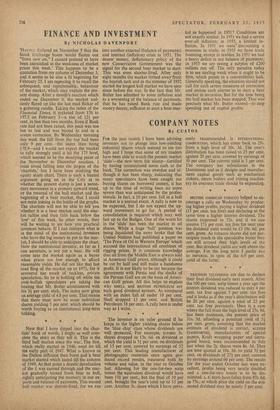FINANCE AND INVESTMENT
By NICHOLAS DAVENPORT
`HAVIN.; :1 ,:.litred on November 5 that the Stock Exchange boom would flatten out "from now on," I cannot pretend to have been astonished at the weakness of market prices this week.' This happens to be a quotation from my column of December 3, and it seems to be also a fit beginning for February 25. I am repeating it to recall the subsequent, and reprehensible, behaviour of the market, which may explain the pre- sent slump. After a month's reaction which ended on December 9, the market sud- denly flared up like the last mad flicker of a guttering candle. Taking the index of the Financial Times, it rocketed from 176 to 197.5 on February 3—a rise of 12+ per cent. in less than two months. Even if Bank rate had not been raised, this pace was too hot to last and was bound to end in a severe correction. By Wednesday morning this week the fall from the top had been only 9 per cent.—the index then being 178.9—and I would not expect the market to rally strongly until it hit the 175 level, which seemed to be the steadying point of the November to December reaction. 1 must avoid falling into the jargon of the 'chartists,' but I have been studying the equity share chart. There is such a heated argument going on in the City as to whether the present slump is just a secon- dary movement in a primary upward trend, or the reversal of the bull market and the beginning of a bear market, that I could not resist joining in the battle of the graphs. The chartists will not he able to tell you whether it is a bear market until the mar- ket rallies and then falls back below the 'low' of this week. In other words, they will be waiting to see how you practical investors behave. If I can interpret what is in the mind of the institutional investors who have the big money to put in the mar- ket, I should be able to anticipate the chart. Now the institutional investor, as far as I can ascertain, is not yet a bear. He will come into the market again as a buyer when prices are low enough to afford reasonable yields. He did not like that last mad fling of the market up to 197+, for it savoured too much of reckless, private speculation. So he is holding off while the over-bullish speculators are taking the beating that Mr. Butler administered with his 31 per cent. stick. The index now gives an average yield of 4.8 per cent. That means that there must now be some individual shares yielding 5 per cent. which should be worth buying as an institutional long-term holding.
Now that I have dipped into the char- tists' book of words, I might as well com- plete the story as they tell it. This is the third bull market since the war. The first, which really started in 1940, went on till the early part of 1947. What is known as the Dalton inflation then burst and a bear market started which lasted till the autumn of 1949. At that point a drastic devaluation of the £ was carried through and the mar- ket gradually turned from bear to bull, rightly anticipating the recovery in our ex- ports and balance of payments. This second bull market was shorter-lived, for we ran into another external (balance of payments) and internal (inflation) crisis in 1951. The dearer money, deflationary policy of the new Conservative Government was the signal for the second bear market to start. This was even shorter-lived. After only eight months the market turned away from the bearish tack and in the summer of 1952 started the longest bull market we have seen since before the war. Is the fact that Mr. Butler has admitted to some inflation and to a worsening of the balance of payments, that he has raised Bank rate and made money dearer, sufficient to start a bear mar- ket as happened in 19517 Conditions are not exactly similar. In 1951 we had a severe over-all inflation; in 1955, a limited in- flation. In 1951 we were' discounting a recession in trade; in 1955 we have trade booming, except in textiles. In 1951 we had a heavy deficit in our balance of payments; in 1955 we are seeing a surplus of £200 million run off. The only paradox today is to see sterling weak when it ought to be firm, which points to a convertibility leak. Generally speaking, the situation should not call for such severe measures of correction and arouse such alarms as to start a bear market in securities. But for the time being the bull market has been stopped. That was precisely what Mr. Butler wanted—to stop spending out of capital profits.










































 Previous page
Previous page